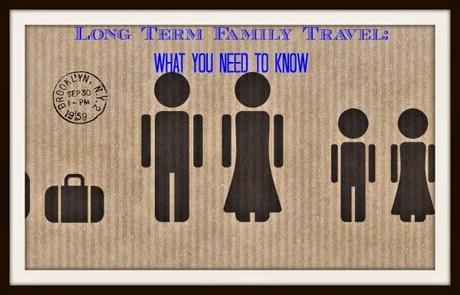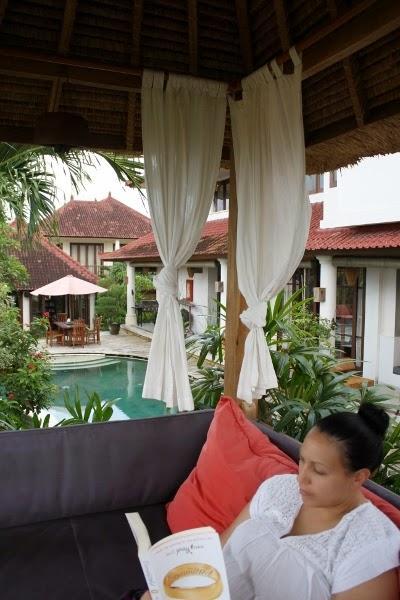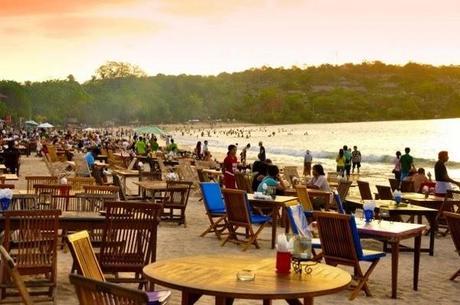 Today's post is the first from our newest staff writer, Iri from Morgans Go Travelling. The Morgans are a family of 6 departing on a 12-month long-term trip around the world beginning December 2014. Iri will be covering the unique aspect of family long-term travel throughout their journey and we are very excited to have her, and the rest of the Morgans, on board!
Today's post is the first from our newest staff writer, Iri from Morgans Go Travelling. The Morgans are a family of 6 departing on a 12-month long-term trip around the world beginning December 2014. Iri will be covering the unique aspect of family long-term travel throughout their journey and we are very excited to have her, and the rest of the Morgans, on board!Embarking on long-term travel as a family can be filled with anticipation and excitement; however, there are many things you need to consider before you leave. As a family of six heading out on a long-term trip, we certainly had our share of things to consider when undertaking a journey of this magnitude.
Where Do You Want To Go?
Having a rough plan of what countries you want to visit will help you work out the best general direction to take. It is preferential to take shorter flights, rather than several long haul flights when traveling with children. This strategy will also help you save money on flights, as shorter flights equal cheaper prices, especially when you fly on budget airlines.
We are in Perth, Australia, at the moment and decided the best direction to take would be clockwise. First stop is Bali, which is only a 3-hour flight from Perth. We have several short flights in Asia and our next long-haul is Asia to Europe.
We are seriously considering a few days stopover in Dubai to break up the 12-hour plus direct flight and make it more manageable with kids. (In particular our 3 year old.)
Europe to USA (New York) will be manageable with the flight time around 6 hours. From USA we will stop in Hawaii on the way to New Zealand, even so this will be our longest flight coming in around 9 hours. (Hawaii to Auckland NZ.)
How Long Do You Want to Travel For?

Having a fixed end date is helpful for planning length of time in each destination. Once you have decided on the places you wish to visit, you can then allocate time in each country. Having an end date also helps when working out your budget.
We chose an end date of 13 months, starting in December 2014 and ending around the 15th of January 2016. When considering our start and end dates we looked at the kids term times for school. In Australia the start of the new school year is usually the first week of February.
After choosing the duration of the trip we then allocated time to each continent. We decided on 4.5 months in Asia, 3.5 months in Europe and the UK, 4 months in Canada and USA and 1 month in New Zealand, thus still giving us flexibility to stay longer in a place if we like it.
Money
How much money do you need? How will you support yourself and your family while on the road? Are you going to save like crazy,or work on the road to make money. Maybe you are going to do a little of both? Either way having enough funds to sustain you while on the road is essentially the most important factor to long-term travel as a family.
We used travel blogs and Numbeo.com (Cost of living index) to work out daily budget in each place. Our budget is $120 per day in Asia for all six of us, $200 a day in Europe and $150 a day in USA, Canada and New Zealand.
After working out the following budget above we were able to get a final figure of what we needed for our family for 13 months. The above daily figures do not include airfares, pre-travel costs, visas or activities they are separate.
Family Friendly Destinations
When choosing where to visit it is also important to consider family friendly locations. If you are traveling with toddlers or babies you will need to consider things like does the country have sidewalks? (Many Asian countries do not have sidewalks.) Countries that are family oriented, or at least have some family friendly activities will make the experience all the more pleasant.
The topic of family friendly destinations can be debatable. Some will say that almost all countries are family friendly, and this can be true depending on your perspective and which part of the country you visit. For example my husband wanted to visit India, and I would love to visit one day but not with children. My girls are 12 and 10 and the boys are 8 and 3 years old and I think that traveling in India would be very difficult with 4 children of these ages.
Vaccinations
Once you have decided what countries you will be visiting you need to check what vaccinations are recommended. A great website to check what vaccinations you need is mdtravelhealth.com. Vaccinations are expensive in some countries, while in others like Asia they are cheap. If Asia is one of your first destinations, look at travel clinics to save money on vaccines to avoid getting them at home.
As Bali is our first stop I found a health clinic that does travel vaccinations. We decided to get the basic vaccines like Typhoid, Hepatitis A and B as well as Tetanus for my hubby. (I had a tetanus injection a few months ago and they are good for 10 years.) By using the travel clinic in Bali we will save our family approximately $600.
Schooling

Depending on the ages of your children, you may also need to consider how you are going to continue their education while on the road.
Are you going to enroll in distance education? This is when your children are still officially enrolled in the state or country you were previously residing and work is done by sending or emailing tasks and assignments to teachers to be marked.
Maybe you want to home school? You may want to register with your country of residence before you leave or you may want to go it alone.
These however are not the only choices available anymore; there is a new movement that has become quite popular in the long-term family travel circles called unschooling. Unschooling refers to the thought that children learn naturally from the world around them, and they decide what interests them and what they want to learn.
There is no set curriculum like homeschooling and distance education. Don’t forget to also check the legal requirements of education in your home country before you leave. In some countries it is illegal to take children out of school for an extended period of time.
As our kids will most likely go back to school when we are done traveling we think it’s important that they keep up with school level mathematics. We are going to be following the Math’s year curriculum for each child in a combination of workbook and online courses. The girls have their own blog so will be keeping that updated by writing posts, making videos and editing photos.
For the rest of the subjects we have decided to take an unschooling approach. We will explore and discover as a family and the children will direct learning from the things we see and experience around us. I am quite excited by this type of learning and can’t wait to see what they discover.
Accessing Money
Researching the best ways to access money on the road will save you hundreds, if not thousands of dollars. Traveller’s cheques have become a thing of the past and using ATMs is the most common way to access money internationally. Look for providers that have no ATM fees, no conversion fees and have reasonable exchange rates. Also have backup cards, or several different cards just in case one is stolen or lost.
In Australia we have found the Citibank Plus Account with debit cards is the best deal. There is no ATM fees and if you find an affiliated ATM no fees on the provider end either. There are zero conversion fees and account keeping fees.
Health
How are you going to keep your family healthy on the road? When traveling with children, infrastructure and proximity to good medical facilities is suddenly very important. If anything were to happen to your child on the road, knowing that you are only a short trip away from a reputable hospital is priceless.
We are planning on doing daily exercise as a family, and trying to eat as healthily as possible. We will take the necessary health precautions in each country including applying Deet in affected countries. Ideally we would like to be within a 1-hour drive of a good hospital.
Visas
What visas do I need to visit this country? You do not want to be turned back when arriving so make sure you know what visas you need in each country. Children sometimes have different costs, and knowing this information could save you money. (Some Border Control officials will not tell you that children are a different price and pocket the difference.)
To keep a track of what visas we need to apply for in advance, I made a table of countries with visa requirements that I can refer to often. You can view our visa costs at this link.
Accommodation

What factors are important to you? What is your budget? Do you need Internet to work? Do you need 2 connecting rooms or an apartment to accommodate your family? Do you want a kids club or playground? Do you need to plan your day around afternoon naps? Is breakfast included? Can I access food easily? Are we close to public transport links? What activities or parks are nearby?
These are all important questions and figuring out the needs of your family will help you book the best accommodation in the right area. Resources like TripAdvisor are excellent for reading reviews about accommodation and the general area before booking.
Our must haves are a clean room or rooms with beds for at least 4 people. (We are traveling with two inflatable camp beds big enough for two of the children) There needs to be good internet connection so we can continue our blog and for the kid’s math’s programs.
We must be within a 10-15 min walk of good public transport links, (3 year old does not walk too far) and we have a budget that we need to stick to. If breakfast is included that is a bonus. We will consider accommodation that is slightly higher in price if it includes breakfast as this will save us around $10-20 on this meal. Lastly, we look for accommodation that is central to the things that we wish to see and do.
Food
Are your children fussy eaters? Will you be able to find food they will eat in all the countries you are visiting? If no, do you have backup meal ideas to feed them? This topic is often overlooked but having a malnourished grumpy child is going to sour your adventure quickly.
I have one very fussy eater that exists on bread, Weetbix, rice and fruit. It is a struggle to get him to eat vegetables or dinner. Luckily for him Asia is the land of rice, and Europe bread and cheese.
It is easy to be overwhelmed with the scale of organization involved when planning or traveling long-term with a family, but if you are prepared you won’t worry as much. Things will not always go to plan and it is helpful to try and look for positive in each experience.
Travelling as a family is a whole different ballgame than traveling solo or pre-kids, however the joys of traveling together are immensely rewarding and your children will cherish forever the special experiences and memories made.
Follow along on the Morgans' upcoming long-term trip at Morgans Go Traveling as well as their featured series here on Living the Dream!
